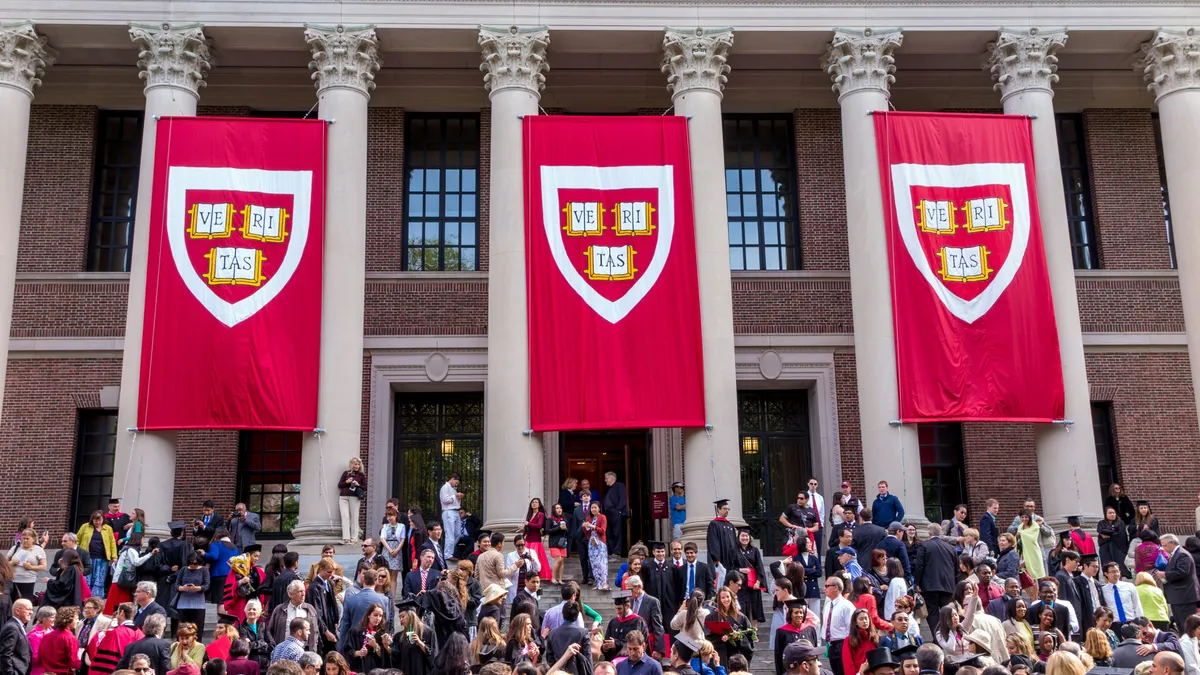Dive Brief:
- A federal judge upheld Harvard University's use of affirmative action in admissions, arguing in court documents filed Monday that the college's policy "passes constitutional muster" because it is "necessary and narrowly tailored to achieve diversity," which benefits the institution.
- Students for Fair Admissions (SFFA), a group that advocates against affirmative action, sued Harvard in 2014, arguing that its use of race-conscious admissions unfairly disadvantages Asian American applicants.
- The group is likely to appeal the decision, and if it is successful, the case could end up at the Supreme Court.
Dive Insight:
The ruling follows a three-week trial last year, in which SFFA accused Harvard of holding Asian American applicants to a higher standard for admission than other students.
Although the Harvard's internal records backed up some of those claims, the judge, Allison Burroughs, wrote in her 130-page decision that there was no evidence of "intentional discrimination" and that the university’s race-conscious admissions policies helped it achieve a level of diversity that wouldn't have been possible otherwise.
Burroughs added that she would not "dismantle a very fine admissions program" that met the law's standards "solely because it could do better."
However, she wrote, Harvard could benefit from implicit bias training, clear guidelines for the use of race in admissions decisions, and monitoring "race-related statistical disparities" in how students are rated.
American Council on Education President Ted Mitchell voiced his group's support of the ruling in a statement emailed to Education Dive Tuesday, saying the decision highlights "the autonomy U.S. colleges and universities have to define the intangible characteristics, like student body diversity, that are central to each institution's identity and educational mission."
Aarti Kohli, executive director of Advancing Justice-Asian Law Caucus, called the ruling "a critical victory for Asian American students," in a separate statement, adding that the use of affirmative action is "an important step" toward broader equity for Asian American students.
An amicus brief filed in support of Harvard last year by more than 500 social scientists and academics argued that affirmative action benefits Asian American students. Detractors contend that if just test scores and GPA were considered, Asian American students would be admitted at higher rates.
Although the ruling marks a victory for supporters of affirmative action, colleges that use it are not in the clear. For one, if SFFA successfully appeals, the case could reach the Supreme Court, which now has a conservative majority with the addition last year of Justice Brett Kavanaugh.
And some members on the bench may be sympathetic to SFFA's argument. Justice Samuel Alito wrote in a dissent to a 2016 higher ed affirmative action decision that the policy could discriminate against Asian American students. Observers say that invited future challenges, including SFFA's latest against Harvard.
SFFA is also suing the University of North Carolina System (UNC) and the University of Texas at Austin over their uses of affirmative action.
Those lawsuits are similr to previous attacks on the policy, which allege it unfairly gives black and Hispanic students a leg up during the admissions process. Although similar lawsuits have failed in the past, they give the group another chance at reaching the Supreme Court.
With moves on several fronts to end the policy, colleges using race-conscious admissions may need to look for alternatives to achieving racial diversity on campus.
The College Board's new Landscape tool, for example, provides admissions officials with standardized data about applicants' high schools and neighborhoods to put their achievements into context. As many as 150 colleges are expected to pilot the tool this year, with some already saying it has helped them admit more underrepresented students.
And Texas' Ten Percent Plan has, for the last two decades, guaranteed students in the top 10% of their high school class admission to one of the state's public universities in an effort to increase college diversity without directly considering race.
However, the data shows that some of these initiatives may not be as effective as affirmative action. Likewise, Burroughs noted that affirmative action is still critical to achieving a diverse student body.
In the meantime, experts say colleges should document their admissions policies and conduct research to understand how the use of affirmative action impacts the students they enroll.















